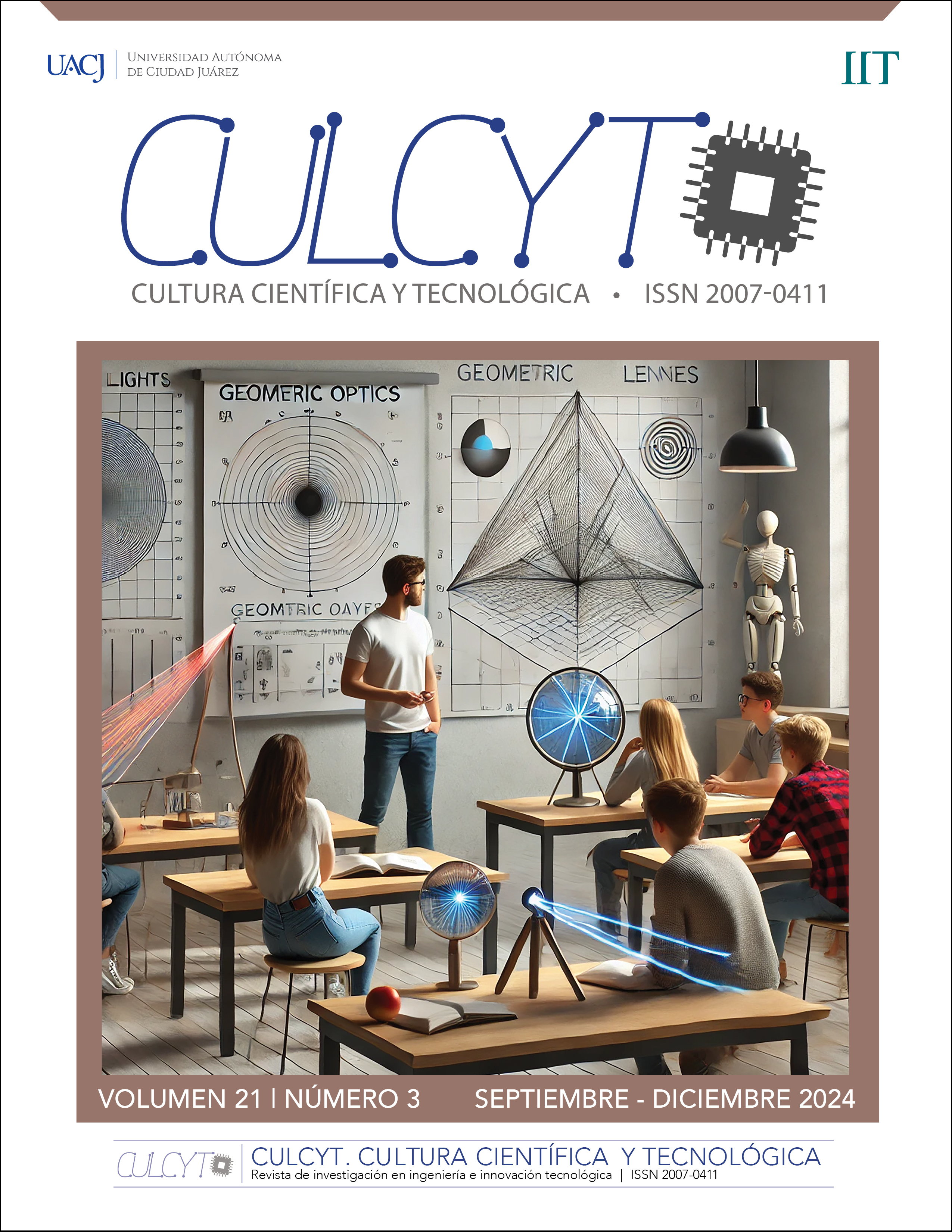Teaching management for the development of numerical problem-solving skills in physics
DOI:
https://doi.org/10.20983/culcyt.2024.3.2e.3Keywords:
numerical problem solving, understanding of the statement, metacognitive strategies, teacher interventionAbstract
Solving numerical physics problems in school is an extremely complex process in which teaching actions that promote the development of cognitive and metacognitive processes in Mexican students that support them in the process of learning how to learn and becoming autonomous students are essential. Due to the large number of factors involved in developing the ability to solve numerical problems, two have been chosen that are considered most relevant and where there is a clear scope of teacher influence: sentence reading comprehension and metacognition of the process. Starting on the theoretical justification based on the results of educational research, these are transformed from the abstract to the concrete and the emphasis is placed on an orientation in daily teaching practice through concrete actions and examples. Although the actions outlined here do not solve all the obstacles students face when solving numerical problems in physics, they constitute an element that promotes better metacognitive and cognitive performance. The work discussed in this article is aimed at high school students, however, the strategies mentioned here may be useful to students at various school levels in Mexico.
Downloads
References
A. García-Díaz, I. García-Alonso y M. Camacho-Machín, “Análisis de la fase de comprensión en la resolución de problemas de matemáticas en el desarrollo de una sesión de clase”, FPIEM, n.º 13, pp. 75-92, 2021.
M. L. Meneses y D. Y. Peñaloza, “Método de Pólya como estrategia pedagógica para fortalecer la competencia en la resolución de problemas matemáticos con operaciones básicas”, Zona Próxima, n.º 31, pp. 8-25, 2019. doi: 10.14482/zp.31.372.7.
OCDE. “PISA 2022 Results (Volume I and II) - Country Notes: Mexico”. OCDE.org. Accedido: jun. 18, 2024. [En línea]. Disponible en: https://Www.Oecd.Org/Publication/Pisa-2022-Results/Country-Notes/Mexico-519eaf88#chapter-D1e11
M. A. Arana, E. Gómez y C. G. Pérez, “Evaluación de una estrategia para disminuir la deserción escolar por reprobación y rezago en un centro escolar de Educación media superior”, Debates en Evaluación y Currículum, vol. 4, n.º 4, pp. 1-11, 2018.
M. Ceberio, J. Guisasola y J. M. Almudí, “¿Cuáles son las innovaciones didácticas que propone la investigación en resolución de problemas y qué resultados alcanzan?”, Enseñanza de las Ciencias, vol. 26, n.º 4 3, pp. 419-430, 2008.
L. Buteler, “La resolución de problemas en física y su relación con el enunciado”, Revista de Enseñanza de la Física, vol. 16, n.º 1, pp. 5-15, 2003.
B. Bravo, M. Montero, M. Juárez y F. Solari, “Desarrollo de la competencia de resolución de problemas ingenieriles en clases de Física”. REIEC, vol. 16, n.º 2, pp. 1-17, 2021, doi: 10.54343/reiec.v16i2.304.
M. H. Ramírez y J. G. Castrejón, “Identification and Classification of Misconceptions in Solving a Variant for the Two-Body Problem”, Transylv Rev, vol. 27, n.º 40, 2019.
M. R. Berraondo, M. Pekolj, N. H. Pérez y R. Cognini, “Leo pero no comprendo. Una experiencia con ingresantes universitarios,” Acta Latinoamericana de Matemática Educativa, vol. 17, pp. 428-434, 2004.
G. Pólya, Cómo plantear y resolver problemas (Serie Matemáticas). México: Editorial Trillas, 1965.
J. Barojas, “Problem solving and writing I: The point of view of physics”, Am. J. Phys. Educ., vol. 1, n.º 1, sept. 2007.
S. Osses y S. Jaramillo, “Metacognición: Un camino para aprender a aprender”, Estud. Pedagóg., vol. 34, n.º 1, pp. 187-197, 2008, doi: 10.4067/S0718-07052008000100011.
M. A. Queiruga, C. Sáiz y E. Montero, Estudio sobre el entrenamiento autorregulatorio en resolución de problemas de física en Secundaria Obligatoria. Cádiz, España: Formación IB, 2018.
M. R. Suárez y L. Cudmani, “Una estrategia metacognitiva y de autorregulación en la resolución de problemas en Física”, Caderno Brasileiro de Ensino de Física, vol. 26, n.º 3, 2009. doi: 10.5007/2175-7941.2009v26n3p514.
Downloads
Published
How to Cite
Issue
Section
License
Copyright (c) 2024 Beatriz Oropeza Villalobos

This work is licensed under a Creative Commons Attribution-NonCommercial 4.0 International License.
Todos los contenidos de CULCYT se distribuyen bajo una licencia de uso y distribución “Creative Commons Reconocimiento-No Comercial 4.0 Internacional” (CC-BY-NC). Puede consultar desde aquí la versión informativa de la licencia.
Los autores/as que soliciten publicar en esta revista, aceptan los términos siguientes: a) los/las autores/as conservarán sus derechos de autor y garantizarán a la revista el derecho de primera publicación de su obra; y b) se permite y recomienda a los/las autores/as agregar enlaces de sus artículos en CULCYT en la página web de su institución o en la personal, debido a que ello puede generar intercambios interesantes y aumentar las citas de su obra publicada.



